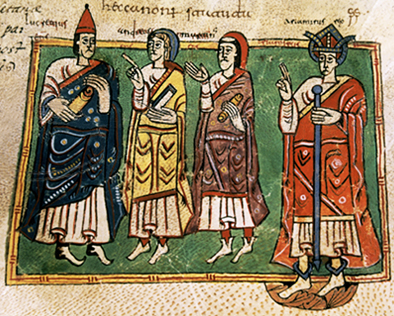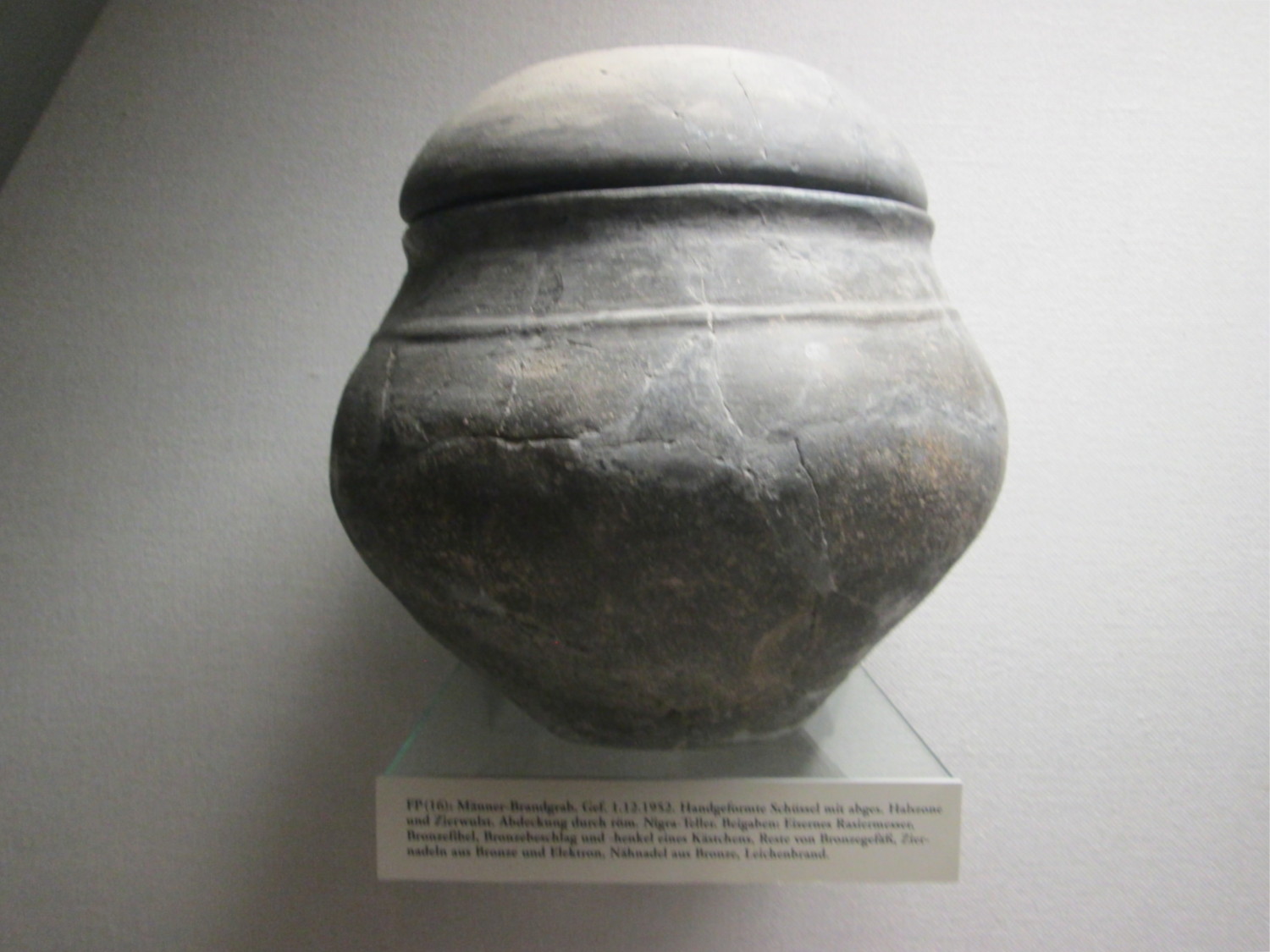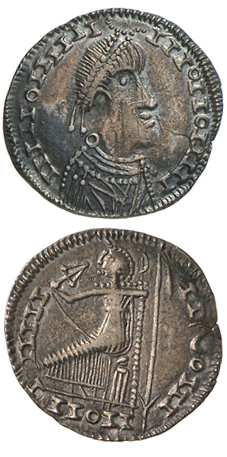|
Ariamir
Ariamir (died before 566) was the Suevic King of Galicia, with his capital at Braga, Bracara, from 558/9. The bishops of the First Council of Braga recorded Ariamir as the king who summoned them and under whose auspices they deliberated. Because the bishops mention theirs as being the first Nicene Creed, Nicene synod to be held in Galicia in a long while, Ariamir is sometimes assumed to have been the king who led the conversion of his people from Arianism to orthodoxy and thus to have lifted the ban on Nicene councils. The conversion of the Suevi to Catholicism, however, is presented very differently in the primary records, of which the minutes of the council of Braga are the only contemporary ones. Specifically, the minutes of the council—which met on 1 May 561 (in the Spanish Era, era of the province 599, the third year of his reign, ''anno tertio Ariamiri regis'')—state explicitly that the synod was held at his orders, ''ex praecepto praefati gloriosissimi Ariamiri re ... [...More Info...] [...Related Items...] OR: [Wikipedia] [Google] [Baidu] |
Chararic (Suevic King)
Chararic or Chararich was the Suebic Kingdom of Galicia, King of Galicia (558/559) according to Gregory of Tours, who is the only primary source for a Suevic king of this name. Following Gregory's account (the ''Historia Francorum'', written between 573 and 579), leprosy was a common disease in Galicia (Central Europe), Galicia during the mid-sixth century and the king's son was a victim. The Suevi at that time were Arianism, Arians, but Chararic, having heard of Martin of Tours, promised to accept the beliefs of the saint if only his son would be cured, and so he sent for some relics from Tours. When the relics were brought to Galicia and his son was healed by the intercession of Saint Martin, Chararic and the entire royal household converted to the Nicene Creed, Nicene faith.Thompson, 83. Gregory also notes that on the same day that Martin's relics entered the Galician harbour, another ship was landing bearing Martin of Braga, Martin of Dumio, future archbishop of Braga and saint. ... [...More Info...] [...Related Items...] OR: [Wikipedia] [Google] [Baidu] |
Theodemir (Suebian King)
Theodemir or Theodemar (also ''Teodomiro'', ; died 570) was one of the last Suevic kings of Galicia and one of the first Chalcedonian Christians to hold the title. He succeeded Ariamir sometime between the end of May 561 and the year 566 and ruled until his death. Theodemir has been posited as the first Orthodox Christian monarch of the Suevi since the death of Rechiar and the monarch who brought about the conversion of his people from Arianism to orthodoxy with the help of the missionary Martin of Dumio. This theory is largely based on the '' Historia Suevorum'' of Isidore of Seville: ''regni potestatem Theodimirus suscepit: qui confestim Arrianae impietatis errore destructo Suevos catholicae fidei reddidit''. However, other sources, notably John of Biclarum and Gregory of Tours, plus the minutes of the First Council of Braga, give or imply different occurrences: John that Reccared I of the Visigoths brought about the conversion of both peoples, Gregory that the saintly inte ... [...More Info...] [...Related Items...] OR: [Wikipedia] [Google] [Baidu] |
Suevi
file:1st century Germani.png, 300px, The approximate positions of some Germanic peoples reported by Graeco-Roman authors in the 1st century. Suebian peoples in red, and other Irminones in purple. The Suebi (also spelled Suavi, Suevi or Suebians) were a large group of Germanic peoples originally from the Elbe river region in what is now Germany and the Czech Republic. In the early Roman era they included many peoples with their own names such as the Marcomanni, Quadi, Hermunduri, Semnones, and Lombards. New groupings formed later, such as the Alamanni and Bavarians, and two kingdoms in the Migration Period were simply referred to as Suebian. Although Tacitus specified that the Suebian group was not an old tribal group itself, the Suebian peoples are associated by Pliny the Elder with the Irminones, a grouping of Germanic peoples who claimed ancestral connections. Tacitus mentions Suebian languages, and a geographical "Suevia". The Suevians were first mentioned by Julius Caesar i ... [...More Info...] [...Related Items...] OR: [Wikipedia] [Google] [Baidu] |
Kingdom Of Galicia
The Kingdom of Galicia was a political entity located in southwestern Europe, which at its territorial zenith occupied the entire northwest of the Iberian Peninsula. In the early 10th century, the Kingdom of Galicia was formed following the division of the Kingdom of Asturias after the death of Alfonso III of Asturias, Alfonso III in 910. His sons split the kingdom, with Ordoño II inheriting Galicia. While Galicia became a distinct political entity, it remained closely tied to the Leonese and Asturian realms through dynastic connections. Later, Ordoño II would integrate Galicia into the Kingdom of León when he inherited the latter. Though the Kingdom of Galicia had moments of semi-independence, it was typically seen as part of the Kingdom of León. Santiago de Compostela, Compostela became the capital of Galicia in the 11th century, while the independence of Portugal (1128) determined its southern boundary. The accession of Castilian King Ferdinand III of Castile, Ferdinand II ... [...More Info...] [...Related Items...] OR: [Wikipedia] [Google] [Baidu] |
King Of Galicia
Galicia (Spain), Galicia is an autonomous community and historical nationality in modern-day northwestern Spain on the Iberian Peninsula, which was a major part of the Roman province known as Gallaecia prior to 409. It consists of the provinces of A Coruña (province), A Coruña, Lugo (province), Lugo, Ourense (province), Ourense and Pontevedra (province), Pontevedra. It is bounded on the north by the Cantabrian Sea, to the south by Portugal, to the west by the Atlantic Ocean and to the east by principality of Asturias and the community of Castile and León. The archipelago of the Cíes Islands, the Ons archipelago, the Sálvora, Sálvora archipelago and other island such as Cortegada Island, Cortegada, A Illa de Arousa, Arousa, the Sisargas Islands and the Malveiras Islands are also part of Galicia. Galicia has about 2,795,422 inhabitants which mainly combines the coastal strip between Ferrol, Galicia, Ferrol and A Coruña in the northwest and between Vilagarcía de Arousa and ... [...More Info...] [...Related Items...] OR: [Wikipedia] [Google] [Baidu] |
Martin Of Tours
Martin of Tours (; 316/3368 November 397) was the third bishop of Tours. He is the patron saint of many communities and organizations across Europe, including France's Third French Republic, Third Republic. A native of Pannonia (present-day Hungary), he converted to Christianity at a young age. He served in the Roman cavalry in Roman Gaul, Gaul, but left military service prior to 361, when he became a disciple of Hilary of Poitiers, establishing the Ligugé Abbey, monastery at Ligugé. He was consecrated as Bishop of Caesarodunum (Tours) in 371. As bishop, he was active in the suppression of the remnants of Gallo-Roman religion. The contemporary hagiographer Sulpicius Severus wrote a ''Life of St. Martin''. He is best known for the account of his using his sword to cut his cloak in two, to give half to a beggar clad only in rags in winter. His Basilica of Saint Martin, Tours, shrine in Tours became an often-frequented stop for Camino de Santiago, pilgrims on the road to Santiago ... [...More Info...] [...Related Items...] OR: [Wikipedia] [Google] [Baidu] |
History Of Braga
Braga (; ) is a city and a municipality, capital of the northwestern Portuguese district of Braga and of the historical and cultural Minho Province. Braga Municipality had a resident population of 201,583 inhabitants (in 2023), representing the seventh largest municipality in Portugal by population. Its area is 183.40 km2. Its agglomerated urban area extends to the Cávado River and is the third most populated urban area in Portugal, behind Lisbon and Porto Metropolitan Areas. It is host to the oldest Portuguese archdiocese, the Archdiocese of Braga of the Catholic Church and it is the seat of the Primacy of the Spains. During the Roman Empire, then known as Bracara Augusta, the settlement was the capital of the Roman province of Gallaecia and later would become the capital of the Kingdom of the Suebi that was one of the first territories to separate from the Roman Empire in the 5th century. Inside of the city there is also a castle tower that can be visited. Nowadays, ... [...More Info...] [...Related Items...] OR: [Wikipedia] [Google] [Baidu] |
Christian Monarchs
A Christian () is a person who follows or adheres to Christianity, a monotheistic Abrahamic religion based on the life and teachings of Jesus Christ. Christians form the largest religious community in the world. The words ''Christ'' and ''Christian'' derive from the Koine Greek title (), a translation of the Biblical Hebrew term '' mashiach'' () (usually rendered as ''messiah'' in English). While there are diverse interpretations of Christianity which sometimes conflict, they are united in believing that Jesus has a unique significance. The term ''Christian'' used as an adjective is descriptive of anything associated with Christianity or Christian churches, or in a proverbial sense "all that is noble, and good, and Christ-like." According to a 2011 Pew Research Center survey, there were 2.3 billion Christians around the world, up from about 600 million in 1910. Today, about 37% of all Christians live in the Americas, about 26% live in Europe, 24% live in sub-Saharan Africa, ... [...More Info...] [...Related Items...] OR: [Wikipedia] [Google] [Baidu] |
560s Deaths
56 may refer to: * 56 (number) * One of the years 56 BC, AD 56, 1956, 2056 * 56.com, a Chinese online video platform * Fiftysix, Arkansas, an unincorporated community in the United States * Fifty-Six, Arkansas, a city in the United States * "Fifty Six", a song by Karma to Burn from the album ''Arch Stanton'', 2014 * 56 Melete, a main-belt asteroid * Isaiah 56 Isaiah 56 is the fifty-sixth chapter of the Book of Isaiah in the Hebrew Bible or the Old Testament of the Christian Bible. This book contains the prophecies attributed to the prophet Isaiah, and is one of the Books of the Prophets.Theodore ..., the fifty-sixth chapter of the Old Testament of the Christian Bible * Cityrider 56, a bus route in Tyne and Wear, UK {{Numberdis ... [...More Info...] [...Related Items...] OR: [Wikipedia] [Google] [Baidu] |
6th-century Suebian Kings
The 6th century is the period from 501 through 600 in line with the Julian calendar. In the West, the century marks the end of Classical Antiquity and the beginning of the Middle Ages. The collapse of the Western Roman Empire late in the previous century left Europe fractured into many small Germanic kingdoms competing fiercely for land and wealth. From the upheaval the Franks rose to prominence and carved out a sizeable domain covering much of modern France and Germany. Meanwhile, the surviving Eastern Roman Empire began to expand under Emperor Justinian, who recaptured North Africa from the Vandals and attempted fully to recover Italy as well, in the hope of reinstating Roman control over the lands once ruled by the Western Roman Empire. Owing in part to the collapse of the Roman Empire along with its literature and civilization, the sixth century is generally considered to be the least known about in the Dark Ages. In its second golden age, the Sassanid Empire reached the ... [...More Info...] [...Related Items...] OR: [Wikipedia] [Google] [Baidu] |
Edward James (historian)
Edward Frederick James (born 14 May 1947) is a British scholar of medieval history and science fiction. He is Emeritus Professor of Medieval History at University College, Dublin. James received the Hugo Award for his non-fiction book ''The Cambridge Companion to Science Fiction'' (co-edited with Farah Mendlesohn), and the Pilgrim Award for lifetime contribution to SF and fantasy scholarship. Biography James was born in Solihull, Warwickshire. He attended the Solihull School and read Modern History at St John's College, Oxford (1965-1968). He completed postgraduate work at the Institute of Archaeology, Oxford, 1968-1970, supervised by Professor Christopher Hawkes. James was awarded D.Phil in 1975, for a thesis entitled ‘South-West Gaul from the fifth to the eighth century: the contribution of archaeology’. He began teaching in 1970 at University College, Dublin. He was a lecturer at the Department of Medieval History in University College Dublin from 1970 to 1978. He w ... [...More Info...] [...Related Items...] OR: [Wikipedia] [Google] [Baidu] |







